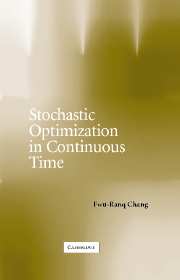Book contents
6 - Boundaries and Absorbing Barriers
Published online by Cambridge University Press: 06 January 2010
Summary
Introduction
In this chapter we shall discuss some issues related to the boundaries of a stochastic optimization problem. We begin with the important issue of the nonnegativity constraint, which is usually overlooked in the literature. Mathematically, the controlled stochastic differential equation that represents the law of motion is defined on the whole real line. The solution to such an equation cannot rule out the possibility that the state variables and/or the control variables are negative at some times on a set of positive probability. Economically, these variables typically represent consumption, stocks of capital, capital–labor ratio, or exhaustible resources. It makes no sense to have negative values for these variables. Since the nonnegativity constraint is not part of the mathematical solutions, more work needs to be done.
To address this issue, we use the optimal growth problem as our example. Our question is this: Is it possible that, with positive probability, the solution to the stochastic Solow equation explodes in finite time or has a negative capital–labor ratio at some point in time? We point out the major difficulties of this problem, and then discuss some methods to tackle it. Among them, we include the comparison theorem, which enables us to compare the solution of one differential equation with the solution of another differential equation that has some nice properties. Then we introduce a reflection method developed by Chang and Malliaris (1987) to solve this nonnegativity problem of optimal growth.
Information
- Type
- Chapter
- Information
- Stochastic Optimization in Continuous Time , pp. 225 - 287Publisher: Cambridge University PressPrint publication year: 2004
